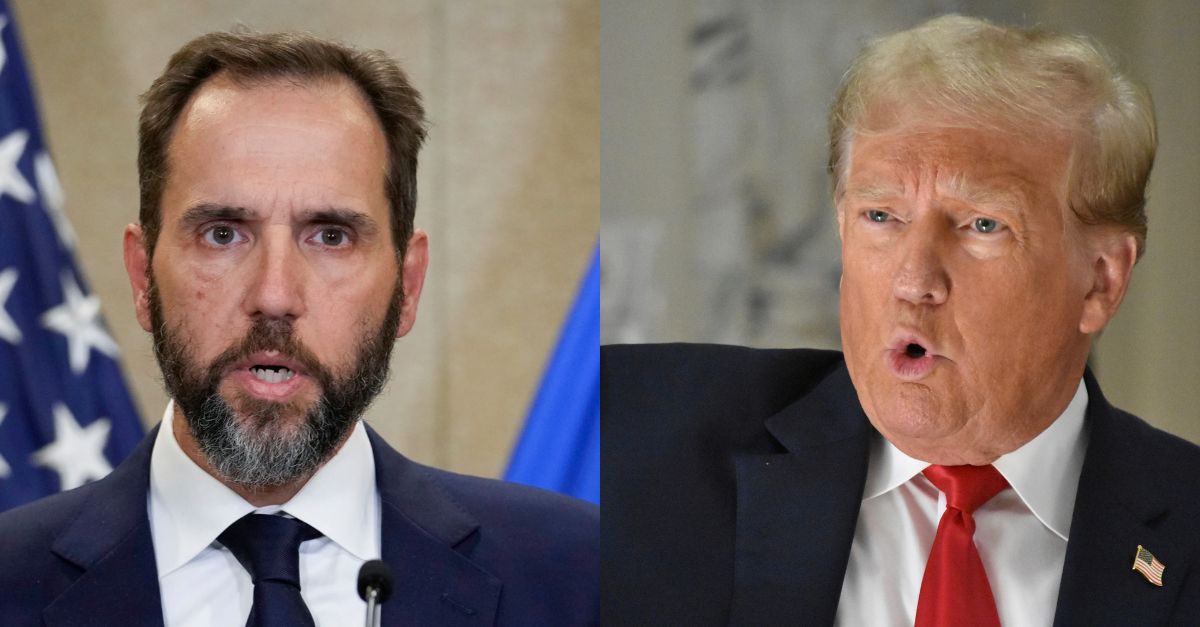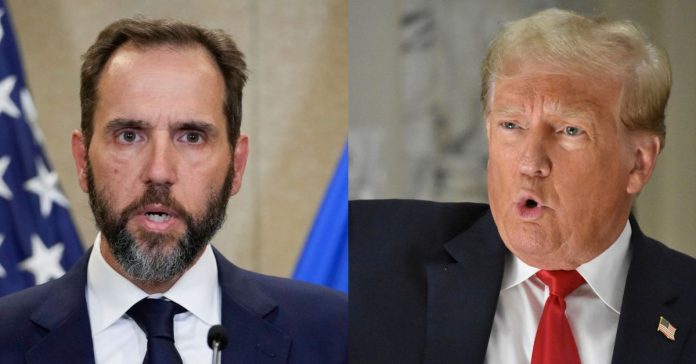
Left: Special counsel Jack Smith speaks to the media about an indictment of former President Donald Trump, Tuesday, Aug. 1, 2023, AP Photo/J. Scott Applewhite./ Right: Former President of the United States Donald J. Trump appears in the hallway of the courthouse to speak to the press on day three of the civil fraud trial in Manhattan, New York, United States on October 4, 2023 (Photo by Kyle Mazza/NurPhoto via AP)
Special prosecutor Jack Smith took a carving knife to Donald Trump’s argument that presidential immunity protects him from criminal charges that he tried to overturn the results of the 2020 presidential election.
In an appellate brief filed Saturday — one week after Trump’s initial appellate brief was filed — Smith was unequivocal that the case against the former president is historic, and that Trump must be held accountable.
“For the first time in our Nation’s history, a grand jury has charged a former President with committing crimes while in office to overturn an election that he lost. In response, the defendant claims that to protect the institution of the Presidency, he must be cloaked with absolute immunity from criminal prosecution unless the House impeached and the Senate convicted him for the same conduct,” the filing says. “He is wrong.”
Trump appealed to the U.S. Circuit Court of Appeals for the District of Columbia after U.S. District Judge Tanya Chutkan, the judge overseeing the federal government’s Jan. 6 election subversion case against the former president, rejected his claim that he is immune to criminal prosecution because he was in office at the time the alleged crimes took place. The special prosecutor had tried to leapfrog the appeals process by going directly to the Supreme Court, but the justices summarily refused to let that happen.
Smith said that principles regarding the separation of powers, legal and historical precedent, and the U.S. Constitution itself “all make clear that a former President may be prosecuted for criminal acts he committed while in office — including, most critically here, illegal acts to remain in power despite losing an election.”
Allowing Trump to maintain immunity, Smith argued, would be tantamount to allowing democracy to unravel.
“Rather than vindicating our constitutional framework, the defendant’s sweeping immunity claim threatens to license Presidents to commit crimes to remain in office,” the brief says. “The Founders did not intend and would never have countenanced such a result.”
Smith argued that while Trump may be immune from civil liability for official conduct, he cannot evade responsibility for criminal acts. The special prosecutor noted that Trump himself has previously made such an argument, and that his appellate brief to the U.S. Court of Appeals for the District of Columbia is “contradicted by his own position.”
“Indeed, the Executive Branch and multiple Presidents, including the defendant, have consistently acknowledged that any criminal immunity ends once a President leaves office,” Smith writes. In support, he cited a brief filed in a case Trump himself brought against former Manhattan District Attorney Cy Vance, who in 2020 sought tax documents relating to Trump and his family business.
In that case, Smith notes, Trump — who argued at that time that he was immune to the criminal process — “emphasiz[ed] that the temporary immunity the defendant sought here in that case ‘would expire when the President leaves office’ and therefore would not ‘place the President “above the law.”‘”
Smith also addressed Trump’s claim that his impeachment in the House of Representatives that came after Jan. 6 — Trump’s second impeachment while serving as president — precludes his criminal prosecution, since the Senate acquitted the former president in February 2021 of inciting an insurrection.
“The Impeachment Judgment Clause limits congressional sanctions for impeachment to removal and disqualification from office; it does not create a double-jeopardy prohibition that protects an impeached but not convicted officer from criminal prosecution,” Smith wrote.
Smith again indicated that the effect of allowing Trump’s immunity claim to stand would be nothing less than devastating — and noted that impeachment and criminal prosecution serve two different purposes.
“Bestowing far-reaching immunity from criminal prosecution on a former President would also expose the Nation to dangerous risks,” Smith wrote. “Under the defendant’s view, unless a former President had been first impeached and convicted, he would be wholly immune from criminal prosecution for acts ostensibly within the outer perimeter of his official duties even when those acts are crimes that benefit him, endanger the Republic, or both. A former President could thus bank on the practical obstacles to impeachment (a remedy designed to remove, not hold criminally accountable, a corrupt officer) to provide a safe harbor insulating him from prosecution once he has left office.”
Trump’s immunity argument is “particularly dangerous” in this case, in which Trump is alleged to have engaged in criminal conduct in an effort to unlawfully stay in power despite losing the election.
“A President who unlawfully seeks to retain power through criminal means unchecked by potential criminal prosecution could jeopardize both the Presidency itself and the very foundations of our democratic system of governance,” the brief said.
Smith considered multiple nightmare scenarios if Trump succeeds with his immunity defense.
That approach would grant immunity from criminal prosecution to a President who accepts a bribe in exchange for directing a lucrative government contract to the payer; a President who instructs the FBI Director to plant incriminating evidence on a political enemy; a President who orders the National Guard to murder his most prominent critics; or a President who sells nuclear secrets to a foreign adversary, because in each of these scenarios, the President could assert that he was simply executing the laws; or communicating with the Department of Justice; or discharging his powers as Commander-in-Chief; or engaging in foreign diplomacy.
“Under the defendant’s framework, the Nation would have no recourse to deter a President from inciting his supporters during a State of the Union address to kill opposing lawmakers — thereby hamstringing any impeachment proceeding — to ensure that he remains in office unlawfully,” Smith added (citations omitted). “Such a result would severely undermine the compelling public interest in the rule of law and criminal accountability.”
The case is being heard by U.S. Circuit Judges Karen LeCraft Henderson, a George H.W. Bush appointee, and J. Michelle Childs and Florence Y. Pan, both Joe Biden appointees.
Read Smith’s filing here.
Have a tip we should know? [email protected]

